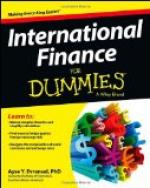For capital, as has been said, is money saved and lent to, or employed in, industry. By being lent to, or employed in, industry it earns its rate of interest or profit. There are nowadays many wise and earnest people who think that this interest or profit taken by capital is not earned at all but is wrung out of the workers by a process of extortion. If this view is correct then all finance, international and other, is organized robbery, and instead of writing and reading books about it, we ought to be putting financiers into prison and making a bonfire of their bonds and shares and stock certificates. But, with all deference to those who hold this view, it is based on a complete misapprehension of the nature and origin of capital.
Capital has been described above as money put to certain purposes. This was done for the sake of clearness and because this definition fits in with the facts as they usually happen in these days. Economists define capital as wealth reserved for production, and we must always remember that money is only a claim for, or a right to, a certain amount of goods or a certain amount of other people’s work. Money is only a title to wealth, because if I have a sovereign or a one-pound note in my pocket, I thereby have the power of buying a pound’s worth of goods or of hiring a doctor to cure me or a parson to bury me or anybody else to do anything that I want, up to the buying power of that sovereign. This is the power that money carries with it. When the owner of this power, instead of exercising it in providing himself with luxuries or amusements, uses it by lending it to someone who wants to build a factory, and employ workers, then, because the owner of the money receives his rate of interest he is said to be exploiting labour, because, so it is alleged, the workers work and he, the capitalist, sits in idleness and lives on their labour.
And so, in fact, he does. But we have not yet found out how he got the money that he lent. That money can only have been got by work done or services rendered, for which other people were ready to pay. Capital, looked at from this point of view, is simply stored up work, and entitled to its reward just as much as the work done yesterday. The capitalist lives on the work of others, but he can only do so because he has wrought himself in days gone by or because someone else has wrought and handed on to him the fruits of his labour. Let us take the case of a shopkeeper who has saved a hundred pounds. This is his pay for work done and risk taken (that the goods which he buys may not appeal to his customers) during the years in which he has saved it. He might spend his hundred pounds on a motor cycle and a side-car, or on furniture, or a piano, and nobody would deny his right to do so. On the contrary he would probably be applauded for giving employment to makers of the articles that he bought. Instead of thus consuming the fruit of his work on his own




